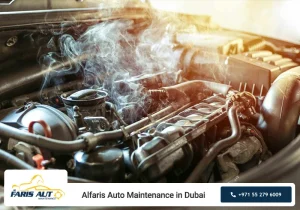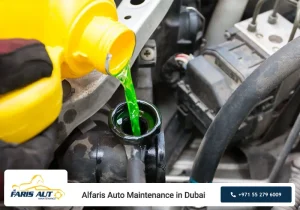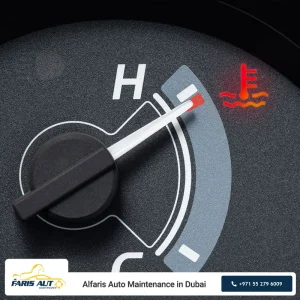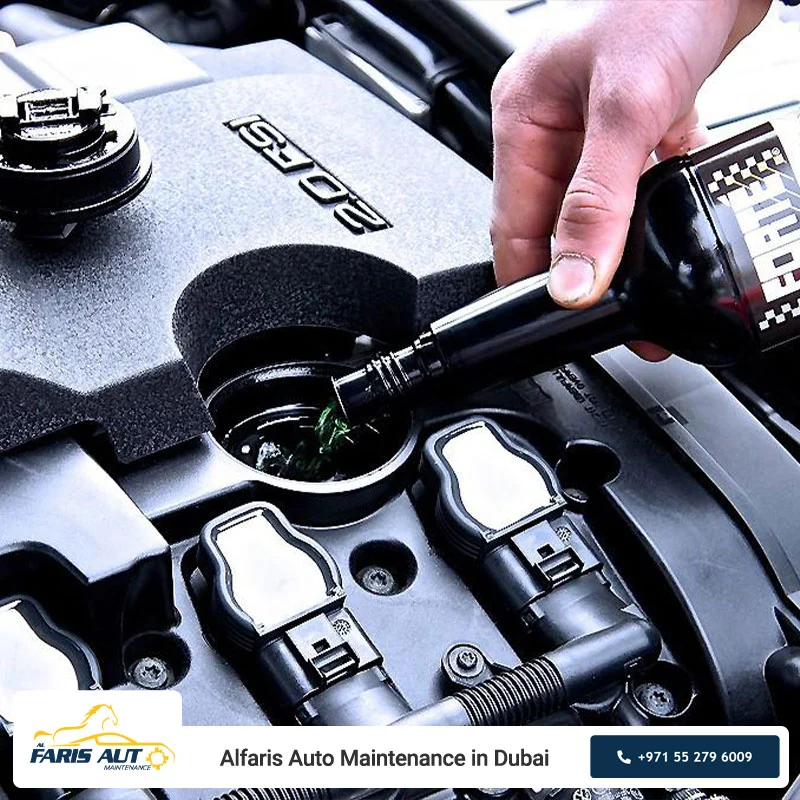Engine overheating is a common issue among car owners, especially in hot cities like Dubai. One of the most important things to know is what to do when the engine overheats. Managing engine temperature is crucial for maintaining your car’s health and ensuring it runs efficiently. The engine is the core component of your vehicle, and if it overheats, it can suffer serious and costly damage. This problem is particularly prevalent during hot seasons and in regions with high temperatures. If left unchecked, engine overheating can cause severe damage such as warping the cylinder head or burning the cylinder head gasket. Therefore, understanding the causes, symptoms, and prevention methods is essential.
This article aims to provide practical tips to prevent your car’s engine from overheating in hot weather. Alfaris Auto Maintenance Center in Dubai will discuss the main causes of engine overheating, warning signs, preventive measures, and what steps to take if your engine starts to overheat. By following this guide, you can keep your engine healthy even under harsh weather conditions and avoid expensive repairs.
Causes of Engine Overheating

Engine overheating in hot weather usually results from various issues in the cooling system or engine performance. One of the most common causes is a low coolant level or insufficient radiator water, which prevents the engine from effectively dissipating heat. Faulty cooling system components such as the radiator, cooling fans, or thermostat can also lead to overheating. For instance, if the radiator fan isn’t working properly, air won’t flow adequately over the radiator, reducing cooling efficiency. Leaks in the cooling system cause coolant loss, which directly contributes to engine overheating.
A clogged or dirty radiator due to dust and debris buildup also reduces the cooling system’s effectiveness. This is especially common in dusty environments or on dirt roads. Additionally, prolonged engine operation in heavy traffic or on steep inclines increases the engine’s thermal load. Using the wrong engine oil or having low oil levels can increase friction between engine parts, further raising the temperature.
Water pump failure, which circulates coolant through the system, and damaged belts related to the cooling system are other important reasons for engine overheating in hot weather. Finally, extremely high ambient temperatures and poor ventilation in the engine bay can create conditions that promote overheating. In summary, cooling system problems, environmental factors, and poor engine condition are the three main contributors to engine overheating in hot climates. For more detailed information, you can also read the article on The Impact of Hot Weather on Car Engines.
Signs of Engine Overheating
Recognizing the signs of engine overheating can help you act before serious damage occurs. The most obvious indicator is the temperature gauge needle moving toward the red zone on your dashboard. If this happens, it means the engine temperature is abnormally high. A burning smell or unusual odors coming from the engine can also signal overheating. This smell often comes from plastic parts or engine oil exposed to excessive heat. Moreover, white or gray steam rising from under the hood indicates boiling coolant escaping from the system.
Other signs include reduced engine power and poor vehicle performance. When the engine overheats, the vehicle’s protective systems may reduce power output to prevent further damage. Warning lights like the check engine light, unusual noises from the engine or fans, and visible coolant leaks under the car are additional signals that should not be ignored.
For example, if you notice the temperature gauge rising rapidly into the red zone on a hot summer day and smell something burning, stop your car immediately and take action to prevent serious engine damage. Understanding the causes and signs of engine overheating helps you decide what to do when the engine overheats.

Contact with AlFaris
You can contact our experts for free consultation, discuss the type of problem or service you are requesting, and arrange for your presence.
Preventing Engine Overheating in Hot Weather
To prevent engine overheating in hot weather, regular and thorough inspection and maintenance of your car’s cooling system and engine are essential. The first step is to check and refill the coolant on time. Always monitor the radiator fluid level and top it up with the correct coolant if it’s low. Using distilled water instead of tap water is recommended to avoid deposits and corrosion.
Regular cleaning and inspection of the radiator and fans are also important. Dust and debris can block airflow and reduce radiator efficiency. Using the right engine oil and changing it regularly ensures better lubrication, reducing friction and heat generation. Don’t forget to check the condition of belts and the water pump, as their failure directly affects coolant circulation. During heavy traffic or long stops, avoid idling the engine if possible, and use the air conditioning efficiently to reduce engine stress.
Parking in the shade or using a sunshade can help lower the overall temperature of your car. Special radiator coolant additives are available that can improve cooling system performance. If the thermostat malfunctions, it should be replaced promptly. Lastly, driving during cooler parts of the day, such as early morning or evening, can reduce engine stress and help prevent engine overheating. If your engine suffers heat-related damage, you can rely on Alfaris Auto’s professional car engine repair services in Dubai.
What to Do When the Engine Overheats?

If you realize your engine is overheating, the first and most important step is to safely pull over and turn off the engine immediately. This is critical to preventing serious damage. Continuing to drive with an overheated engine can cause irreversible harm. After turning off the engine, wait a few minutes to let it cool down before carefully opening the hood.
Once the engine has cooled somewhat, check the coolant level. If it’s low, cautiously add coolant or lukewarm water (never cold water) to the radiator. Never open the radiator cap quickly while the engine is hot, as steam pressure can cause hot coolant to spray out. If possible, gently cool the radiator with water, but avoid pouring cold water directly on hot engine parts to prevent cracking. If the problem persists and the engine temperature remains high, contact a professional mechanic or roadside assistance to avoid further damage.
Do not drive the vehicle again until the issue is fixed. Diagnostic tools like OBD scanners are very helpful in identifying engine problems, especially in modern cars. For more information, you can check the list of OBD codes.
Engine overheating in hot weather is a problem that can be easily prevented by following simple tips. Knowing the main causes, watching for warning signs, and taking preventive steps like checking coolant levels, cleaning the radiator, and using the right engine oil are key to keeping your engine healthy.




